Seven IPPC regional workshops, one common agenda-strengthening global phytosanitary capacity
Posted on Sat, 30 Sep 2023, 09:24
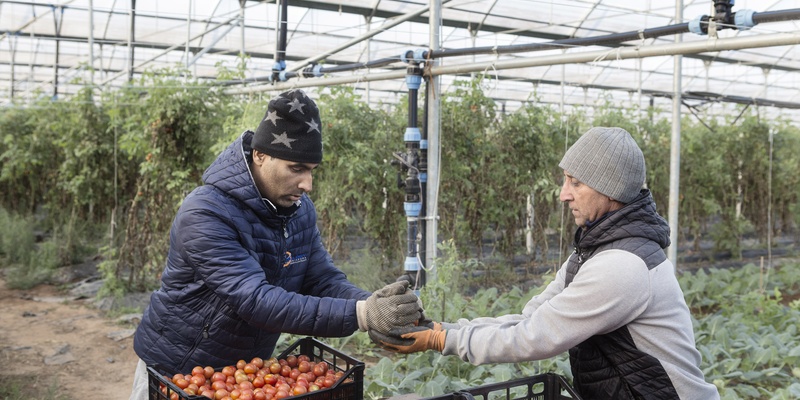
© Alessandro Penso
Rome, 30 September 2023. The International Plant Protection Convention (IPPC) Secretariat successfully conducted seven high-level technical workshops in seven regions worldwide, with a uniform goal of providing a platform for regional plant health communities to contribute to the development of plant health standards as well as implementation and capacity development resources that will boost the phytosanitary capacity of countries to prevent and contain pests.
The IPPC Regional Workshops are annual IPPC activities and this year, took place from 18 August to 8 September 2023. They were held in Africa, Asia, the Caribbean, Europe and Central Asia, Latin America, Near East and North Africa, and Southwest-Pacific, with 302 participants from 133 IPPC contracting parties attending. The regional workshops enabled participants to comment on draft International Standards for Phytosanitary Measures (ISPMs), which form the basis for countries to make national phytosanitary legislation and requirements. The workshops also helped to raise awareness of various activities of the IPPC community and enabled interaction and exchange of ideas and experiences to strengthen plant health at the regional level. Discussions ranged from adoption of the IPPC ePhyto Solution, conducting pest prevention simulation exercises, and increasing awareness about emerging plant pest challenges and potential solutions.
The IPPC Secretariat organized the workshops in collaboration with local organizing committees comprising regional plant protection organizations (RPPOs), partners, and the Food and Agriculture Organization of the United Nations (FAO).
“Our greatest strength lies in the dedication, passion and expertise of the plant health community. We can fulfill our collective mission more effectively by working together to adopt and implement international phytosanitary standards," said Osama El-Lissy, IPPC Secretary.
Here are some highlights from the 2023 regional workshops:
Africa: Something new dawning for plant health
Several topics highlighted the discussion at the 2023 IPPC Regional Workshop for Africa, held in Addis Ababa, Ethiopia. Osama El-Lissy, IPPC Secretary introduced the Africa Phytosanitary Programme (APP), a new initiative aimed at enhancing the technical capacity of national plant protection organizations (NPPOs) to effectively control pests of regulatory, economic and environmental significance in a timely manner. By the end of the workshop, participants were calling for integration of APP in the Africa regional phytosanitary strategy of the African Union and creating awareness about the programme. Osama thanked the IPPC community in Africa for attending the workshop and urged contracting parties to establish mechanisms to implement the IPPC Strategic Framework 2020-2030, a global roadmap to protect plants and natural resources from pests.
A tabletop exercise on Fusarium Tropical Race 4 (TR4) of banana created simulation of various actions that countries can take in the likely event of introduction and spread of the destructive pest that can cause 100 percent yield loss. TR4 is a big problem in Africa and so, the simulation exercise boosted the participants' capacity to undertake a Pest Risk Analysis to identify possible risk management measures. They also drafted an early warning and preparedness plan and developed a communication strategy highlighting key stakeholders, preferred communication channels and risk communication messages.
Complementing the exercise and underscoring the importance of TR4 in Africa, Mozambique shared lessons learned from its TR4 contingency plan. The country set up a multi-disciplinary team to develop a water-proof action plan towards delimiting areas affected by TR4 and apply measures to reduce the spread of the pathogen in Mozambique, while continuing to strengthen the technical capabilities of its phytosanitary personnel.
Speaking at the workshop, Abebe Haile- Gabriel, Assistant Director-General of FAO’s Regional Office in Africa underscored the importance of investment and strategies that anticipate the challenges from the pest-related predicament in Africa. He noted that the IPPC regional workshop is an appropriate platform for African countries to discuss strategies to strengthen phytosanitary capacity on the continent.
Sandrine Bayendi Loudit, who represented Her Excellency Josefa Sacko, the Commissioner of Agriculture, Rural Development, Blue Economy and Sustainable Environment of the African Union Commission, noted that the success of plant protection in Africa requires coordinated and harmonized action across the continent, as well as adherence to the IPPC standards, especially in the context of the African Continental Free Trade Area.
Wondale Habtamu, Deputy Director General of the Ethiopian Agricultural Authority and NPPO for Ethiopia commended the sanitary and phytosanitary (SPS) capacity building efforts in Africa, which he said would contribute towards improving Ethiopia’s newly established regulatory body, Ethiopia Agriculture Authority (EAA). The EAA focuses on developing control, inspection, and approval procedures, including digitization, and supporting private sector compliance with SPS requirements.
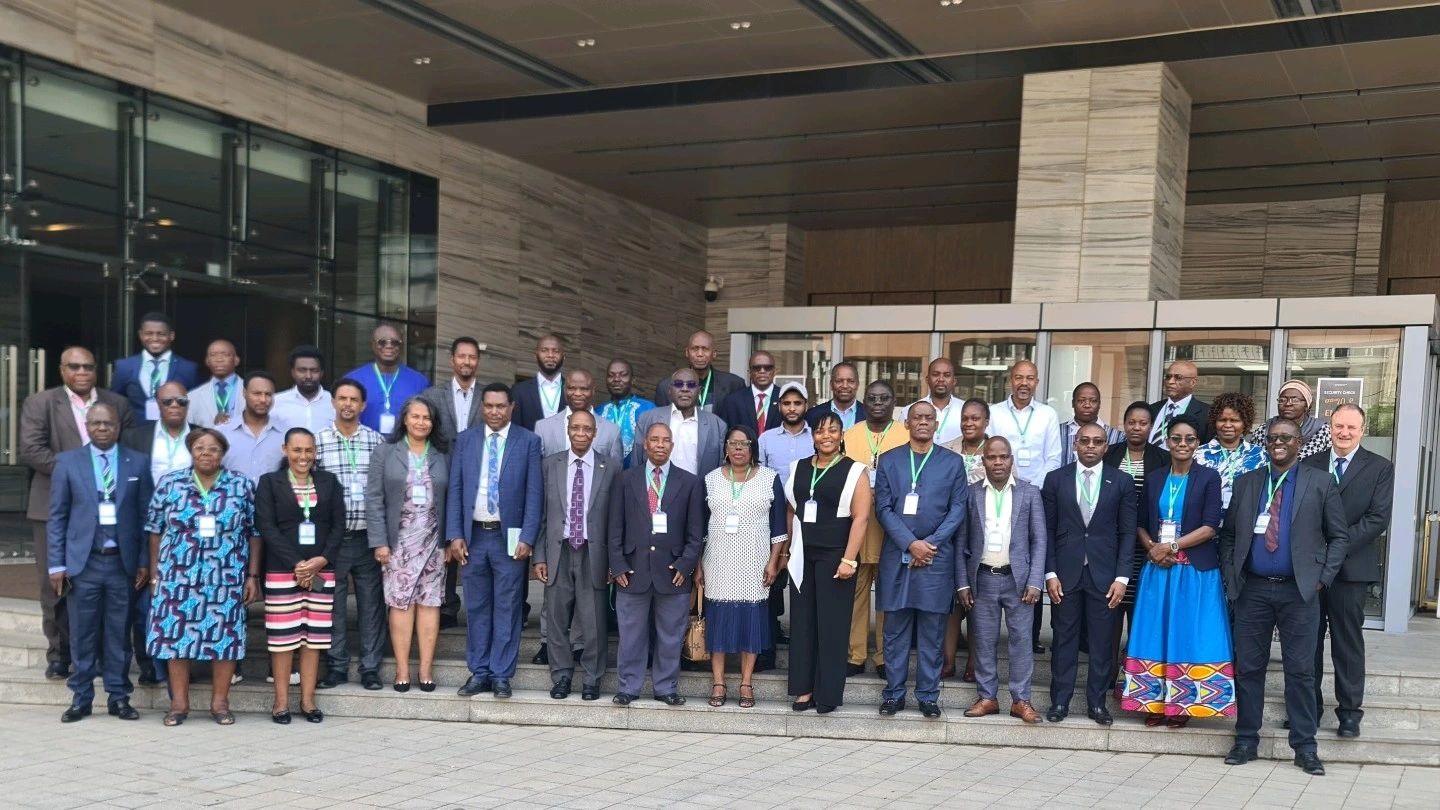
Asia: Planning for global plant health action
As one of the main and longest-running activities of the Asia and Pacific Plant Protection Commission (APPPC), the workshop enabled countries to discuss comments on draft ISPMs - such as pest risk analysis and the glossary of phytosanitary terms. They will present these as regional comments and propose topics in response to the 2023 IPPC Call for Topics that could be developed into phytosanitary standards in the future.
The workshop in Busan, Korea had 32 participants from 16 countries: Australia, Bangladesh, Bhutan, Cambodia, China, Indonesia, Japan, Lao People's Democratic Republic, Malaysia, Nepal, New Zealand, Philippines, Republic of Korea, Sri Lanka, Thailand, and Viet Nam. It was organized by the Republic of Korea's Animal and Plant Quarantine Agency (APQA)- also the host, APPPC, the FAO Regional Office for Asia and the Pacific, and the IPPC Secretariat. Jung-hee Kim, Commissioner of APQA officiated at the workshop.
For a region with significant international trade, e-commerce and wood packaging material were prominent topics of discussion. In the case of e-commerce, countries shared their experiences in managing the pest risk associated with international e-commerce trade. The workshop also discussed the IPPC ePhyto Solution and how to support countries in the region to implement their national systems in the ePhyto Solution. The IPPC ePhyto Solution is an innovative tool that allows issuance of digital phytosanitary certificates, thereby making the exchange of phytosanitary information between importing and exporting countries quicker, more reliable and less prone to error or fraud.
Countries stressed the importance of the International Day of Plant Health. They called upon the IPPC and NPPOs to increase promotion and visibility of the annual event to raise global awareness on how protecting plant health can help end hunger, reduce poverty, protect biodiversity and the environment, and boost economic development. Participants of the five-day workshop also visited Shinhung Company Limited; a wood packaging manufacturer of pallets compliant with ISPM 15 (Regulation of wood packaging material in international trade). They also visited Gyeongnam Smart Farm Innovation Valley Project, which produces tomatoes, strawberries and paprikas using artificial intelligence hydroponics systems.

Caribbean: Preparedness: First step in pest prevention
The workshop was held together with the Caribbean Plant Health Director (CPHD) Forum at St. Paul’s, Antigua and Barbuda. The CPHD Forum discusses pertinent plant health issues in the Caribbean and so, combining it with the IPPC regional workshop amplified the need for stronger regional and international collaboration to address phytosanitary challenges.
Like in Africa, Fusarium TR4 was a key topic of discussion, with presentations on IPPC activities related to TR4 such as TR4 response simulation exercises. The Colombian Corporation for Agricultural Research (AGROSAVIA) and Organismo Internacional Regional de Sanidad Agropecuaria (OIRSA) shared their success story on TR4 preparedness in Latin America, which involved several TR4 simulation exercises. However, they recommended that countries in the region carry out more tabletop exercises than simulations, which they consider expensive. Participants included representatives from the Caribbean Agricultural Health and Food Safety Agency (CAHFSA), Inter-American Institute for Cooperation on Agriculture (IICA), and member countries of the Caribbean Community (CARICOM).
Janil Gore-Francis, Chief Plant Protection Officer of the Plant Protection Division, Ministry of Foreign Affairs, Agriculture, Trade and Barbuda Affairs chaired the workshop. Other key participants were Shaun Baugh, Programme Manager for Agriculture at the CARICOM Secretariat, Shelah Morita, Assistant Director of Plant Protection and Quarantine Preclearance and Offshore Programmes, at the United States DEpartment of Agriculture, Craig M. Thomas, National Specialist at the IICA Delegation in Antigua and Barbuda, and Gavin Peters, Chief Executive Officer of CAHFSA.
In his keynote address, Everly Paul Chet Greene from the Ministry of Foreign Affairs, Agriculture, Trade and Barbuda Affairs, stressed the importance of regional collaboration and understanding of international phytosanitary activities for sustainable plant health.
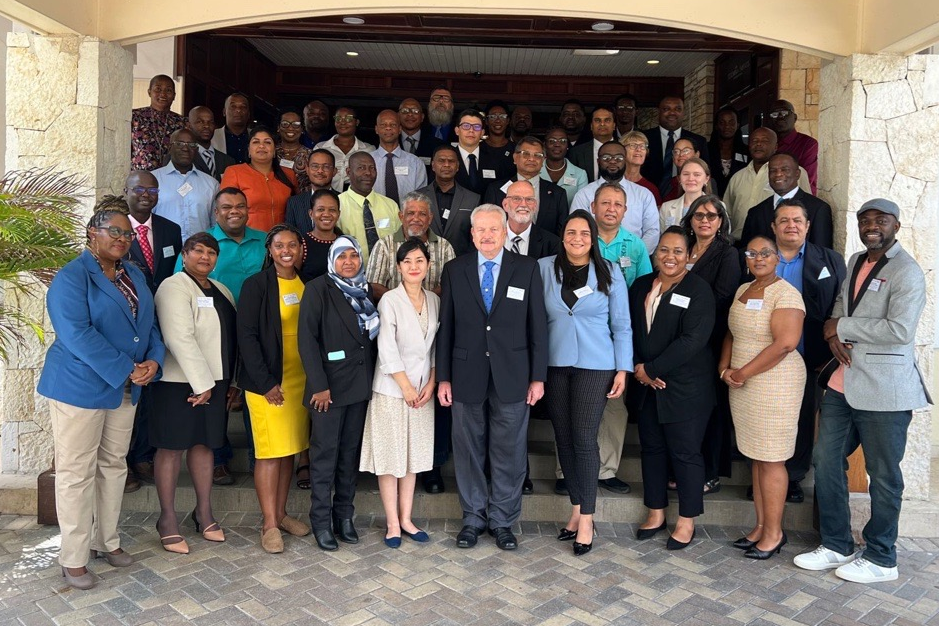
Europe and Central Asia: Making bold steps to promote phytosanitary excellence
The workshop for the Europe and Central Asia region, held in Podgorica, Montenegro, brought to the fore several issues, including promoting the adoption of the IPPC ePhyto solution and supporting countries to conduct effective Phytosanitary Capacity Evaluations (PCEs). Thirty-four participants from 20 countries in the region reiterated their commitment to digitalization for safer, faster, and more cost-effective trade of agricultural commodities. They believe that one way of effecting this digitization is through widespread adoption of the IPPC ePhyto Solution, an innovative tool that allows issuance of digital in place of paper-based phytosanitary certificates during trade. They also highlighted the Central Asia Regional Cooperation Conference on ePhyto held in Uzbekistan in September, attended by countries aspiring to adopt ePhyto in the region. However, funding for ePhyto remains a challenge for many countries.
Uzbekistan’s success with the Phytosanitary Capacity Evaluation (PCE) process was another highlight. Thanks to PCE modules that Uzbekistan conducted five years ago, the country made amendments to its plant quarantine legislation. Building on this success, Uzbekistan implemented more PCE modules in 2022-2023 and will develop a national phytosanitary capacity development strategy and implement recommendations to strengthen its phytosanitary service. To encourage other countries to replicate Uzbekistan’s example, the IPPC Secretariat confirmed the confidentiality of the results of PCEs facilitated by the secretariat.
The workshop was organized with support from the FAO Regional Office for Europe and Central Asia, the European and Mediterranean Plant Protection Organization (EPPO), and hosted by the Directorate for Food Safety, Veterinary and Phytosanitary Affairs of the Government of Montenegro. Workshop participants were from the European Union, EPPO, and observers from the Animal and Plant Health Inspection Service (APHIS) of the U.S. Department of Agriculture (USDA), and from the Plant Health in the Western Balkans project. Vladimir Joković, Deputy Prime Minister for Economic System and Minister of Agriculture, Forestry and Water Management of Montenegro opened the workshop.
Participants thanked the IPPC Secretariat for its Guides and Training Materials, specifically the IPPC Emergency Preparedness: A guide for developing contingency plans for outbreaks of quarantine pests, which enhance their technical capabilities to carry out necessary phytosanitary activities. In fact, the All-Russian Centre for Plant Quarantine proposed to translate one of the IPPC capacity development resources into Russian. Relatedly, participants requested that future IPPC Regional Workshops include more capacity development activities such as tabletop simulation exercises on a pest of concern in the region.
The workshop concluded with a field visit to the 13.jul Plantaže vineyard, one of the most important producers of grapes in the world. The 2 300 hectares vineyard produces approximately 22 million kilos of grapes annually.
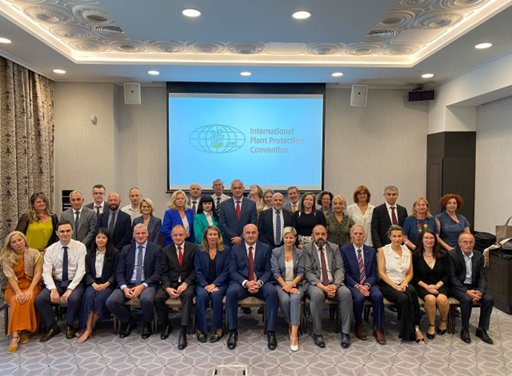
Latin America: Committed to advancing international plant health
The hybrid workshop held in San Jose, Costa Rica had 93 participants from 18 Latin América countries commenting on draft ISPMs, a draft CPM recommendation, and a draft specification for a guide on audits. They reiterated the importance of networking at the regional level to address common phytosanitary challenges.
Participants were from the Inter-American Institute for Cooperation on Agriculture (IICA)- which provided logistical support and meeting facilities, regional plant protection organizations- Comunidad Andina (CAN), Comite de Sanidad Vegetal del Cono Sur (COSAVE), Organización Internacional Regional de Sanidad Agropecuaria (OIRSA), the IPPC Secretariat, FAO regional office for Latin America and the Caribbean, and NPPOs from the region. Also present were members from the Commission on Phytosanitary Measures (CPM) Bureau, the IPPC Standard Committee, IPPC’s Implementation and Capacity Development Committee, and members of national plant protection organizations.
During the discussion, COSAVE declared its intention to submit two annexes to ISPM 47 (Commodity specific standards for phytosanitary measures) oranges and bananas. Other presentations and discussions during the workshop focused on the use of new guides and training materials, the importance of PCE implementation, the IPPC ePhyto Solution, and e-commerce. Regional level issues included managing pests that affect the region, such as HLB (Huanglongbing), Tuta absoluta or tomato leaf miner, fruit flies, Fusarium TR4, locusts, and the giant African snail.
“IICA is committed to working with participating countries, to promote implementation of international standards to foster safe, fluid plant and plant product commerce,” said Jose Urdaz, the IICA Programme Manager. The 2024 IPPC regional workshop for Latin America will be held in Nicaragua.
Near East and North Africa: Collaboration essential for plant health interventions
Representatives of the plant health community in the Near East and North Africa (NENA) region met in Buraidah, AL Qassim, Kingdom of Saudi Arabia for the 2023 IPPC regional workshop.
The workshop was organized in collaboration with the FAO regional office for Near East and North Africa, the Near East Plant Protection Organization (NEPPO), and the National Center for the Prevention and Control of Plant Pests and Animal Diseases (WEQAA). Forty-four participants from 17 IPPC contracting parties attended; Algeria, Egypt, Iraq, Jordan, Lebanon, Mauritania, Morocco, Oman, Qatar, Saudi Arabia, Sudan, Tunisia and Yemen (all in person) and Bahrain, Iran, Libya and Syria (virtually).
Abdelhakim El-Waer, FAO Assistant Director-General and Regional Representative in the NENA region and Ayman Al-Ghamdi, CEO of WEQAA Center officiated at the workshop. El-Waer highlighted the immense threat of plant pests and diseases on agriculture in the NENA region, which are compounded by increased movement of trade and people and the ease of movement of plant materials.
Besides discussions on substantive comments on draft standards and regional topics of interest, the workshop focused on the management of the NEPPO, encouraged members to actively participate in global and regional calls and meetings and stressed the need for more financial and technical support to enhance NEPPO activities. Contracting parties were encouraged to designate in-kind contributions to NEPPO and the IPPC Secretariat, particularly in translation and interpretation during meetings and recruitment of staff.
"The effect of pests on agriculture in our region, coupled with increased movement of trade and people and the ease of movement of plant materials, compounds the risks facing the NENA economy”, said El-Waer. “This is in addition to other challenges such as political unrest, economic and humanitarian crises, weak phytosanitary systems, and lack of good coordination among the countries of the region ", he added.
“The Kingdom of Saudi Arabia encourages joint work with the authorities concerned with protecting plant health regionally and internationally, based on the Kingdom's keenness on global food security and achieving sustainable growth in the region, in line with the Kingdom's Vision 2023,” said Al-Ghamdi.
He stressed the importance of holding IPPC's annual regional workshop to connect plant protection organizations in the region to exchange and discuss various phytosanitary issues.
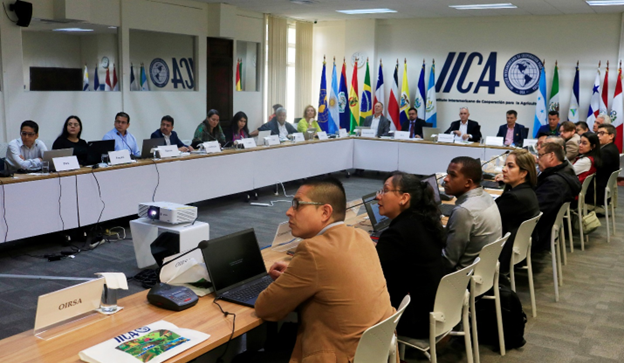
Southwest Pacific: Focus on international phytosanitary standards
Rarotonga, Cook Islands was the location for this year’s IPPC 2023 Regional Workshop for the Southwest Pacific region. The Pacific Plant Protection Organization (PPPO) and its members reviewed the IPPC draft ISPMs under consultation, exchanged information, ideas and experiences, and received updates from the various IPPC subsidiary bodies and the IPPC Secretariat.
The 35 participants from 20 countries and territories expressed their enthusiasm about the development of IPPC guides and training materials and highlighted climate change, safe provision on food and other humanitarian aid, and ePhyto solutions as some of the current top priorities for the region.
The workshop was opened by Her Excellency Vainetutai Rose Toki-Brown, Minister of Agriculture for Cook Islands. She emphasized the importance of plant health, cooperation among nations, and the participation of women in policy making fora. Other key participants were Temarama Anguna-Kamana, Secretary of Agriculture, Cook Islands, Ngatoko Ngatoko, NPPO Focal Point for Cook Island Director and IPPC Implementation and Capacity Committee (IC) member, Gabrielle Vivian-Smith, IPPC Bureau member for the Southwest Pacific and Australian Chief Plant Protection Officer, Sophie Peterson, IPPC Standards Committee Chairperson and Director, Pacific Engagement and International Plant Health in Australia, Joanne Wilson, IPPC Standards Committee member, Visoni Timote, PPPO Executive Secretary and Nacanieli Waqa from Ministry of Primary Industries in New Zealand who also chaired the workshop.
The workshop participants appreciated the presence and support of the IPPC Secretariat and requested sustained support to address the region's needs.
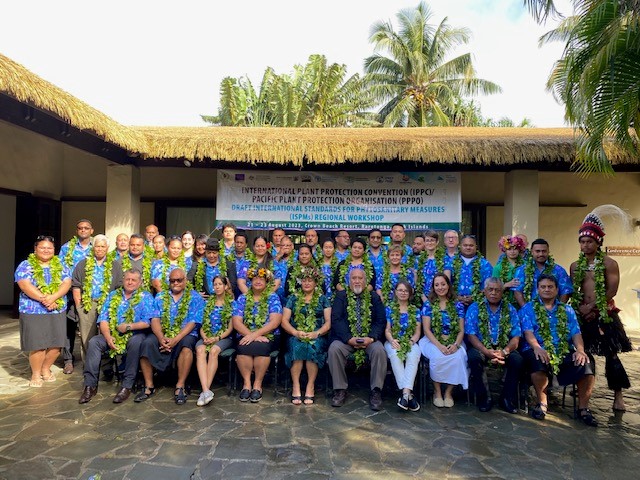
Find more information and reports of the 2023 IPPC Regional Workshops here.

